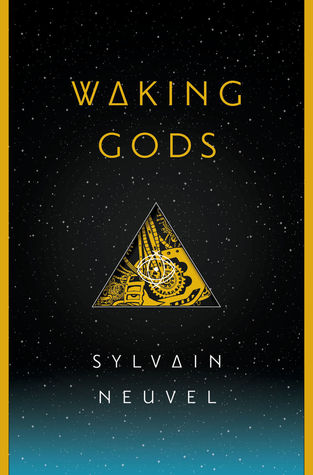Well! Waking Gods certainly doesn’t waste any time, I’ll tell you that much. Despite taking place about ten years after the first book (Sleeping Giants), everything is as urgent and immediate as ever. Global cooperation is tenuous; scientific advancement is not as far along as anyone would like; and another giant robot shows up in the middle of London.
Themis, the giant alien robot whose assembly and function consumed most of the first book, has been accepted as a global peacekeeper more as a combination of resignation and acclimation than any sort of futuristic idealism. She’s* an indestructible robot that can destroy huge swaths of land (or population) with little effort, and she’s piloted by two people who literally cannot be replaced. She can’t be stolen, hacked, or defeated. And because the world is in relatively decent shape, she mostly does photo ops. Pragmatism rules the day.
The robot that appears in London, dubbed Kronos, disrupts this fragile order. It almost doesn’t help that Kronos doesn’t do anything once he arrives. It would almost be easier if he attacked: nothing unites people like a fight with only two sides. But Kronos only observes, and the world is of fractured mind when it comes to what to do about it. Some are thrilled: the opportunity to engage with aliens, at long last! Others are fearful, and want to evacuate or even attack. And yet still more–strangely but, let’s admit it, very realistically–look up at the stories-tall titan, go “huh,” and just want to get on with their days. It’s the whole range of humanity on display in this book, not just its best and worst elements.

Yet despite the general population’s insouciance, never have delicate, complicated geopolitics felt so swashbuckling. We get just enough information to understand that the nations of the world are just as heterogeneous as they’ve always been, full of infighting and competition as they’ve always been. Transcripts from Parliament show coalition leaders jockeying for more power, putting British–or the own–interests ahead of the good of the world, and even a bit of name-calling. Humans are still being human, in other words.
Being human, we get ourselves into some less-than-ideal situations once we start responding to the aliens. And the aliens, despite being more technologically advanced, respond…let’s say less than ideally as well, since I don’t want to spoil anything. Waking Gods manages to do this without adhering to the more popular optimistic/pessimistic dichotomy, too–this is neither Starfleet utopia nor dystopian plague-y ruin. I would say that it’s realistic with a large dash of hope. Things do get dark, though. Very dark. There are moments of humor, but parts of this book really broke my heart. Not that it stopped or even slowed my reading. Like the characters, I didn’t dare stop until the solution was found. It’s that engrossing.
Neuvel is able to do this because of his continued use of the “found document” style of writing that cuts down on any extraneous descriptions or transitions. Once again his book is lean and precise, getting to the heart of every matter with private diary entries and teaching the background science and politics with Socratic dialogue. Everything else is presented as a “transcript” so we get to-the-moment dialogue pared of even the usually requisite markers of “he said” and “she went.” This format doesn’t always work, but when it does it enhances both the immediacy and the stakes, since we have the implicit understanding that all of this was recorded for future reference because it was already acknowledged as critically important. It cuts right to the chase, and the whole book is one big chase: chasing knowledge and chasing time, both of which are in very short supply.
The knowledge part is also a slam dunk: the explanations and solutions are so much fun to read because Neuvel is so adept at writing about a broad array of scientific topics for laymen. We have a lot of scientist characters who have evidently taken the (wrongly-attributed) Einstein quote to heart: if you can’t explain it simply, you don’t understand it well enough (he didn’t say that, but it’s still true). A xenolinguist, a geneticist, and a physicist are all hard at work trying to ensure the survival of the human race, but through them Neuvel gives some excellent explanations to his non-expert characters–and to us as well. I don’t know if you would classify this as “hard SF,” but the distinction doesn’t matter so much when the explanations are so thorough but straightforward. The non-scientist characters get to be experts, too–in warfare, espionage, population management, and even hand-to-hand combat. This book has everything! And–as a cherry on top–we finally get the story of the nameless spook who orchestrated the whole first book. I’m still not clear on how Neuvel fit all this in.
The overall message isn’t overly complicated, though. Communication, research, and the scientific method will save the world; military action will doom us. Can’t say I disagree with any of that. It’s nice to see scientists saving the world with generals and world leaders finally deferring to their expertise. Even if their expertise is, in one critical moment, hilariously dependent on Google Maps. But that’s what genius is, isn’t it? Using what you have. Your brain, your cell phone, your megaton mecha–this whole book offers up the ingenuity and insight of the human race, as weird and wonderful as it can be.
Waking Gods comes out April 4.
